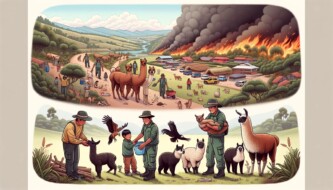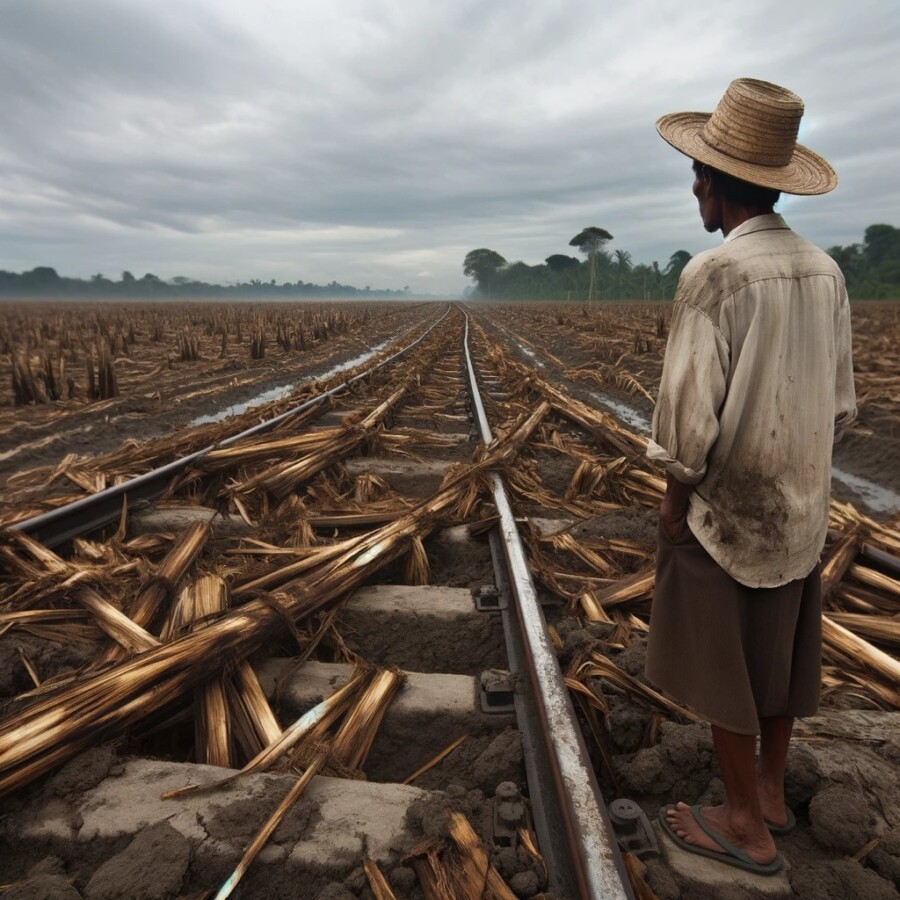Indian spices, which are known for their delicious flavors and beautiful colors, are facing some safety concerns around the world. Countries like Singapore, Hong Kong, and the US have stopped selling spices from Indian companies MDH and Everest because they might have too much of a pesticide that can cause cancer. The European Union, Maldives, Bangladesh, and Australia are also investigating this issue. This isn’t the first time Indian spices have been found to be contaminated, with past cases of having too much lead or being mixed with other things. Now, people are worried about the safety of Indian spices, and the government is doing tests and giving guidelines to exporters.
MDH and Everest are popular and trusted brands in India. MDH has been around for 105 years and is a family business, while Everest says it’s the biggest spice maker in India. The government is trying to fix the problem by doing tests and giving guidelines. But people are worried that this could hurt India’s reputation as a spice exporter and cause problems in the future. A report from a think tank even said that half of India’s spice exports could be at risk because of these safety concerns.
To make sure that India’s spice exports are safe, it’s important to have transparency, strict rules, and clear communication. Experts think that India needs to make big changes to how it handles food safety. People in the West don’t always know where their spices come from, so it’s important to have more information and be open about where the spices are coming from. In the end, India needs to make food safety a priority if it wants to keep being a big player in the global spice market.
Original news source: Indian spices face heat over global safety concerns (BBC)
🎧 Listen:
Slow
Normal
Fast
📖 Vocabulary:
| 1 | contaminated | Made dirty or harmful by adding something unwanted |
| 2 | pesticide | A chemical used to kill insects that harm plants |
| 3 | guidelines | Rules or instructions on how to do something |
| 4 | exporters | People or companies that sell goods to other countries |
| 5 | reputation | The general opinion people have about someone or something |
| 6 | transparency | Being open and honest, without secrets |
| 7 | strict | Very firm and not allowing any exceptions |
| 8 | communication | The act of sharing or exchanging information |
| 9 | priority | Something that is more important than other things |
| 10 | investigating | Looking into something carefully to find out more about it |
| 11 | trusted | Believed to be reliable or honest |
| 12 | risk | The possibility of something bad happening |
| 13 | think tank | A group of experts who give advice and ideas on a specific topic |
| 14 | safety | The condition of being protected from danger or harm |
| 15 | reputation | The general opinion people have about someone or something |
Group or Classroom Activities
Warm-up Activities:
– News Summary
Instructions: In pairs, students will read the article and create a summary of the main points. They should focus on the safety concerns surrounding Indian spices and the potential impact on India’s spice exports. After writing their summaries, they can share with the class and compare their responses.
– Opinion Poll
Instructions: Divide the class into small groups and assign each group a specific role (e.g. consumers, spice exporters, government officials, health experts). Each group will discuss and share their opinions on the safety concerns surrounding Indian spices. They should also discuss potential solutions or actions that could be taken. After their discussion, each group will present their opinions to the rest of the class.
– Vocabulary Pictionary
Instructions: Write down key vocabulary words from the article on separate pieces of paper and place them in a bag or bowl. Divide the class into teams. One student from each team will draw a word from the bag and have to draw a picture representing that word. Their team members will try to guess the word. The team with the most correct guesses wins.
– Pros and Cons
Instructions: In pairs or small groups, students will create a list of the pros and cons of continuing to sell Indian spices despite the safety concerns. They should consider both the economic and health implications. After their discussion, each group will present their lists to the class and engage in a class-wide debate on the topic.
– Future Predictions
Instructions: Students will work individually or in pairs to write a short paragraph predicting the future of India’s spice exports. They should consider the potential impact of the safety concerns and any actions that could be taken to address the issue. After writing their predictions, students can share with the class and discuss their ideas.
🤔 Comprehension Questions:
1. What are some safety concerns surrounding Indian spices?
2. Which countries have stopped selling spices from Indian companies MDH and Everest?
3. Why are people worried about the safety of Indian spices?
4. How long has MDH been in business?
5. What could happen to India’s reputation as a spice exporter because of these safety concerns?
6. What changes do experts think India needs to make to how it handles food safety?
7. Why is it important for people in the West to have more information about where their spices come from?
8. What does India need to prioritize if it wants to remain a big player in the global spice market?
Go to answers ⇩
🎧✍️ Listen and Fill in the Gaps:
Indian spices, which are known for their delicious flavors and beautiful (1)______, are facing some safety concerns around the world. Countries like Singapore, Hong Kong, and the US have (2)______ selling spices from Indian companies MDH and (3)______ be(4)______ they might have too much of a pesticide that can cause cancer. The European Union, Maldives, Bangladesh, and Australia are also investigating this issue. This isn’t the first time Indian spices have been found to be contaminated, with past (5)______ of having too much lead or being (6)______ with other things. Now, people are worried about the (7)______ of Indian spices, and the government is doing tests and giving guidelines to exporters.
MDH and Everest are popular and trusted brands in India. MDH has been around for 105 years and is a family (8)______, while Everest says it’s the biggest spice (9)______ in India. The government is trying to fix the problem by doing (10)______ and giving guidelines. But people are worried that this could hurt India’s reputation as a spice exporter and cause problems in the future. A report from a think tank even said that half of India’s spice (11)______ could be at risk because of these safety concerns.
To make sure that India’s spice exports are safe, it’s (12)______ to have transparency, strict rules, and clear communication. (13)______ think that India needs to make big changes to how it (14)______ food safety. (15)______ in the West don’t always know where their spices come from, so it’s important to have more information and be open about where the spices are (16)______ from. In the end, India needs to make food safety a priority if it wants to keep being a big player in the global spice market.
Go to answers ⇩
💬 Discussion Questions:
Students can ask a partner these questions, or discuss them as a group.
1. What is a pesticide and why can it be harmful?
2. How would you feel if you found out that the spices you were using were contaminated with pesticides?
3. Do you like using Indian spices in your cooking? Why or why not?
4. Do you think it’s important for countries to test and regulate the safety of imported spices? Why or why not?
5. What do you think could happen to India’s reputation as a spice exporter if the safety concerns are not addressed?
6. How would you feel if you were a spice exporter from India and your business was affected by these safety concerns?
7. Do you think it’s important for consumers to know where their spices come from? Why or why not?
8. What changes do you think India should make to improve food safety in the spice industry?
9. How do you think the safety concerns could impact the global spice market?
10. Why do you think Indian spices are known for their delicious flavors and beautiful colors?
11. Have you ever tried Indian spices in your cooking? If so, what was your experience like?
12. How do you think the government can effectively communicate safety guidelines to spice exporters?
13. Do you think other countries should continue to investigate the safety of Indian spices? Why or why not?
14. What measures do you think should be taken to ensure the transparency of spice exports from India?
15. Why do you think it’s important for India to prioritize food safety in order to remain competitive in the global spice market?
Individual Activities
📖💭 Vocabulary Meanings:
Match each word to its meaning.
Words:
1. contaminated
2. pesticide
3. guidelines
4. exporters
5. reputation
6. transparency
7. strict
8. communication
9. priority
10. investigating
11. trusted
12. risk
13. think tank
14. safety
15. reputation
Meanings:
(A) Something that is more important than other things
(B) The condition of being protected from danger or harm
(C) Made dirty or harmful by adding something unwanted
(D) People or companies that sell goods to other countries
(E) The possibility of something bad happening
(F) The act of sharing or exchanging information
(G) Believed to be reliable or honest
(H) Very firm and not allowing any exceptions
(I) Being open and honest, without secrets
(J) Looking into something carefully to find out more about it
(K) The general opinion people have about someone or something
(L) A group of experts who give advice and ideas on a specific topic
(M) A chemical used to kill insects that harm plants
(N) Rules or instructions on how to do something
(O) The general opinion people have about someone or something
Go to answers ⇩
🔡 Multiple Choice Questions:
1. Why have countries like Singapore, Hong Kong, and the US stopped selling spices from Indian companies MDH and Everest?
(a) The spices might have too much of a pesticide that can cause cancer.
(b) The spices are too expensive.
(c) The spices are not flavorful enough.
(d) The spices are not colorful enough.
2. Which countries are also investigating the safety concerns with Indian spices?
(a) China, Japan, and South Korea.
(b) Brazil, Argentina, and Mexico.
(c) Canada, United Kingdom, and Germany.
(d) The European Union, Maldives, Bangladesh, and Australia.
3. What have Indian spices been found to be contaminated with in the past?
(a) Too much salt or being mixed with other spices.
(b) Too much sugar or being mixed with other ingredients.
(c) Too much oil or being mixed with other condiments.
(d) Too much lead or being mixed with other things.
4. What are MDH and Everest?
(a) Indian cities known for their spice production.
(b) Types of Indian spices.
(c) Popular and trusted spice brands in India.
(d) Indian government organizations responsible for food safety.
5. What is the government doing to fix the problem with Indian spices?
(a) Doing tests and giving guidelines.
(b) Banning the sale of all Indian spices.
(c) Ignoring the issue and hoping it goes away.
(d) Promoting the use of other spices from different countries.
6. What could be at risk because of the safety concerns with Indian spices?
(a) Half of India’s population.
(b) Half of India’s agricultural industry.
(c) Half of India’s spice exports.
(d) Half of India’s tourism industry.
7. What do experts think India needs to do to ensure the safety of its spice exports?
(a) Stop exporting spices altogether.
(b) Make big changes to how it handles food safety.
(c) Increase the price of its spices.
(d) Start importing spices from other countries.
8. Why is it important for India to have transparency and clear communication about its spice exports?
(a) India wants to keep its spice exports a secret.
(b) People in the West don’t always know where their spices come from.
(c) India wants to increase the price of its spices.
(d) People in the West don’t like Indian spices.
Go to answers ⇩
🕵️ True or False Questions:
1. Some countries, including Singapore, Hong Kong, and the US, have stopped selling spices from Indian companies MDH and Everest due to safety concerns.
2. Experts believe that India does not need to implement transparency, strict rules, and clear communication to ensure the safety of its spice exports.
3. The European Union, Maldives, Bangladesh, and Australia are also investigating the safety concerns surrounding Indian spices.
4. There are concerns that these safety concerns could harm India’s reputation as a spice exporter and impact future trade.
5. The government is not conducting tests and providing guidelines to exporters in order to address the issue.
6. This is the first time Indian spices have been found to be contaminated, with past cases involving excessive lead or adulteration.
7. Indian spices are not known for their delicious flavors and beautiful colors.
8. The pesticide found in these spices is believed to have the potential to cause cancer.
Go to answers ⇩
📝 Write a Summary:
Write a summary of this news article in two sentences.
Check your writing now with the best free AI for English writing!
Writing Questions:
Answer the following questions. Write as much as you can for each answer.
Check your answers with our free English writing assistant!
1. What are some safety concerns surrounding Indian spices?
2. Which countries have stopped selling spices from Indian companies MDH and Everest?
3. Why are people worried about the safety of Indian spices?
4. How long has MDH been in business?
5. What changes does India need to make to ensure the safety of its spice exports?
✅ Answers
🤔✅ Comprehension Question Answers:
1. What are some safety concerns surrounding Indian spices?
Some safety concerns surrounding Indian spices include the presence of pesticides that can cause cancer, contamination with lead or other substances, and the overall safety and quality of the spices.
2. Which countries have stopped selling spices from Indian companies MDH and Everest?
Countries such as Singapore, Hong Kong, and the US have stopped selling spices from Indian companies MDH and Everest.
3. Why are people worried about the safety of Indian spices?
People are worried about the safety of Indian spices because of the potential health risks associated with consuming spices that may contain excessive amounts of pesticides or other contaminants.
4. How long has MDH been in business?
MDH has been in business for 105 years.
5. What could happen to India’s reputation as a spice exporter because of these safety concerns?
India’s reputation as a spice exporter could be negatively affected if these safety concerns are not addressed, potentially leading to a loss of trust and a decline in demand for Indian spices.
6. What changes do experts think India needs to make to how it handles food safety?
Experts believe that India needs to make significant changes to how it handles food safety, including implementing transparency, strict rules, and clear communication. They also suggest providing more information about the origin of spices and prioritizing food safety.
7. Why is it important for people in the West to have more information about where their spices come from?
It is important for people in the West to have more information about where their spices come from because it allows them to make informed choices about the products they consume. Knowing the origin of spices can help ensure their safety and quality.
8. What does India need to prioritize if it wants to remain a big player in the global spice market?
India needs to prioritize food safety if it wants to remain a big player in the global spice market. This includes implementing stricter regulations, conducting regular testing, and ensuring clear communication and transparency throughout the supply chain.
Go back to questions ⇧
🎧✍️✅ Listen and Fill in the Gaps Answers:
(1) colors
(2) stopped
(3) Everest
(4) cause
(5) cases
(6) mixed
(7) safety
(8) business
(9) maker
(10) tests
(11) exports
(12) important
(13) Experts
(14) handles
(15) People
(16) coming
Go back to questions ⇧
📖💭✅ Vocabulary Meanings Answers:
1. contaminated
Answer: (C) Made dirty or harmful by adding something unwanted
2. pesticide
Answer: (M) A chemical used to kill insects that harm plants
3. guidelines
Answer: (N) Rules or instructions on how to do something
4. exporters
Answer: (D) People or companies that sell goods to other countries
5. reputation
Answer: (K) The general opinion people have about someone or something
6. transparency
Answer: (I) Being open and honest, without secrets
7. strict
Answer: (H) Very firm and not allowing any exceptions
8. communication
Answer: (F) The act of sharing or exchanging information
9. priority
Answer: (A) Something that is more important than other things
10. investigating
Answer: (J) Looking into something carefully to find out more about it
11. trusted
Answer: (G) Believed to be reliable or honest
12. risk
Answer: (E) The possibility of something bad happening
13. think tank
Answer: (L) A group of experts who give advice and ideas on a specific topic
14. safety
Answer: (B) The condition of being protected from danger or harm
15. reputation
Answer: (K) The general opinion people have about someone or something
Go back to questions ⇧
🔡✅ Multiple Choice Answers:
1. Why have countries like Singapore, Hong Kong, and the US stopped selling spices from Indian companies MDH and Everest?
Answer: (a) The spices might have too much of a pesticide that can cause cancer.
2. Which countries are also investigating the safety concerns with Indian spices?
Answer: (d) The European Union, Maldives, Bangladesh, and Australia.
3. What have Indian spices been found to be contaminated with in the past?
Answer: (d) Too much lead or being mixed with other things.
4. What are MDH and Everest?
Answer: (c) Popular and trusted spice brands in India.
5. What is the government doing to fix the problem with Indian spices?
Answer: (a) Doing tests and giving guidelines.
6. What could be at risk because of the safety concerns with Indian spices?
Answer: (c) Half of India’s spice exports.
7. What do experts think India needs to do to ensure the safety of its spice exports?
Answer: (b) Make big changes to how it handles food safety.
8. Why is it important for India to have transparency and clear communication about its spice exports?
Answer: (b) People in the West don’t always know where their spices come from.
Go back to questions ⇧
🕵️✅ True or False Answers:
1. Some countries, including Singapore, Hong Kong, and the US, have stopped selling spices from Indian companies MDH and Everest due to safety concerns. (Answer: True)
2. Experts believe that India does not need to implement transparency, strict rules, and clear communication to ensure the safety of its spice exports. (Answer: False)
3. The European Union, Maldives, Bangladesh, and Australia are also investigating the safety concerns surrounding Indian spices. (Answer: True)
4. There are concerns that these safety concerns could harm India’s reputation as a spice exporter and impact future trade. (Answer: True)
5. The government is not conducting tests and providing guidelines to exporters in order to address the issue. (Answer: False)
6. This is the first time Indian spices have been found to be contaminated, with past cases involving excessive lead or adulteration. (Answer: False)
7. Indian spices are not known for their delicious flavors and beautiful colors. (Answer: False)
8. The pesticide found in these spices is believed to have the potential to cause cancer. (Answer: True)
Go back to questions ⇧















